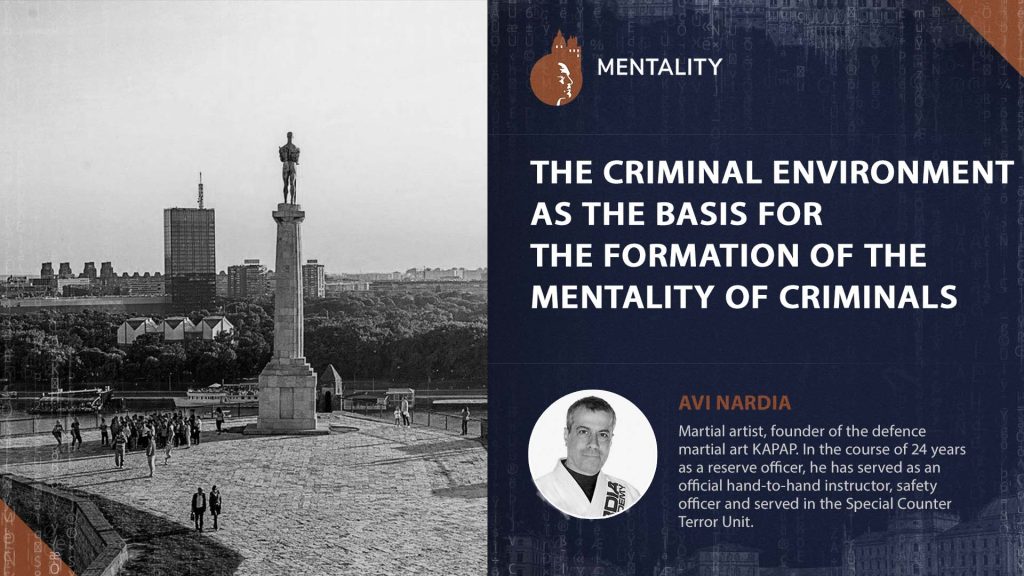
The criminal environment as the basis for the formation of the mentality of criminals
Avi Nardia
Security expert, martial artist, founder of the defence martial art KAPAP.
For a long time, it was common to think about human being as a product of biological and social circumstances. This paradigm represents a person as a passive product of the genotype and social environment, while ignoring the personal factor of the free will. New times are bringing the necessity of transforming this paradigm into a new one, which is based not only on a person as a biological and social product but includes psychological factors. This new model indicates three factors which influence the formation of the mentality: hereditary predispositions, socio-cultural conditions and the free will of human being. This third factor is manifested as a choice of ways of behavior and is strongly influenced by big changes in the socio-economic sphere of society nowadays.
As we know the child doesn’t meet society directly but through the medium of the family i.e., parents who represents the social structure and who are the psychological agents of society. Through interaction with parents the child interacts with the dominant culture and values. In this subtle weaving of culture and subcultures and different social strata, the child makes its own interpersonal experiences and try to build his “self” or the feeling of “I am”. Growing up within the boundaries of the society many experience the weakening of their “self” by expectations of the society.
Today we come across many people saying they do not feel authentic and they lack spontaneity and individuality. But at the same time, they are in the same position as many others who feel the same. The cultural pattern saves them from braking out of social boundaries and leaving them in the void. In some cases, the cultural pattern does not suffice to prevent the outbreak of a manifest psychological problems. This is where the importance and role of different subcultures comes into play. Society has different levels of compensations for problems, which are culturally patterned and they work hand in hand together.
“Because everyone is guilty for everyone else. For all the ‘wee ones,’ because there are little children and big children. All people are ‘wee ones.” (F. Dostoyevsky, The Brother Karamazov)
However, it is not only the influence of society and people on us in terms of shaping of good or bad character traits under the influence of a suggestive environment, but we are also the ones who influence people with whom we are often together. In a word, we are responsible for the behavior of other people as well. If we reach one degree higher in our own humanization, we will understand those words of old Zosima from the novel The Brothers Karamazov.
When we say that each culture consist of many different subcultures we want to say they are in a dialectical relationship and form the structural constraints of one society. One of the most famous proverbs “The road to hell is peeved with good intentions” can be a good example of how our society functions. In general, the idea that good intensions do not guarantee good results or matter little if they don’t end up in good outcomes or what is more important in creation of circle of good deeds. Not only people often intend to good but fail to do anything but they also hide behind good intentions so they can commit bad things. But what is common for doing good is that people often expect to be reciprocated, they expect to be thanked to, praised or rewarded for their actions.
Observing people in distant history, we see that such behavior was the basis for their survival and was a feature of a tribal coexistence. It is a reflection of tribal consciousness and we can say also the basis of corruption. As our society has not yet risen above tribal coexistence, we can see that starting from lives of ordinary people to entire countries with their governments, doing “good deeds” and expecting the return of services has led corruption to an integral part of the lives of all people on the planet. Debt relations rule the planet. They run in all pores of societies and create a bewitched circle of abuse with an established scene for different criminal activities. In this scenario or let’s call it an environment it is very easy to shape the mentality of criminals.
When we talk about the criminals we often have a dark and morbid view of the crime and the people behind those horrifying acts. We ask ourselves how does a person become a criminal? What is the reason to become one? Some criminologists have uncovered a number of factors that can lead someone toward crime such as childhood experiences, negative social environment, substance abuse, anti-social values, low self-control, etc. Here we are in a domain of what society defines as a criminal act and sanctions accordingly but in this short article we want to point out the responsibility of all of us in creating an atmosphere of pervasive crime and inability to step out of this circle of corruption which is a basic fabric of the largest number of criminal activities in the world.
This new paradigm, which includes a free will of human being as a third factor that influence the formation of the mentality is manifested as a choice of ways of behavior and gives us hope that this chain of corruption and setting for criminal activities might one day come to an end. By actively participating in making right decision irrespective of social pressure people can lead the society towards collective healing and allowing themselves authenticity and spontaneity as a way of their lives.